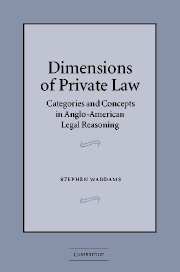Book contents
- Frontmatter
- Contents
- Preface
- Table of cases
- 1 Introduction: the mapping of legal concepts
- 2 Johanna Wagner and the rival opera houses
- 3 Liability for economic harms
- 4 Reliance
- 5 Liability for physical harms
- 6 Profits derived from wrongs
- 7 Domestic obligations
- 8 Interrelation of obligations
- 9 Property and obligation
- 10 Public interest and private right
- 11 Conclusion: the concept of legal mapping
- Works cited
- Index
2 - Johanna Wagner and the rival opera houses
Published online by Cambridge University Press: 15 July 2009
- Frontmatter
- Contents
- Preface
- Table of cases
- 1 Introduction: the mapping of legal concepts
- 2 Johanna Wagner and the rival opera houses
- 3 Liability for economic harms
- 4 Reliance
- 5 Liability for physical harms
- 6 Profits derived from wrongs
- 7 Domestic obligations
- 8 Interrelation of obligations
- 9 Property and obligation
- 10 Public interest and private right
- 11 Conclusion: the concept of legal mapping
- Works cited
- Index
Summary
The twin cases of Lumley v. Wagner (1852) and Lumley v. Gye (1853), decisions respectively of the courts of Chancery and Queen's Bench, were perceived in their time, and indeed have been perceived ever since, to have determined crucial issues of fundamental importance in English private law. The then very recent Common Law Procedure Act of 1852, putting an end to the forms of action, had opened the question of organization and classification of concepts, and required the common law courts to give new thought to the description and explanation of private law. Contract, wrongdoing, unjust enrichment, property, and public policy were all involved in these cases and interrelated in a complex way, and the relation between fact and law was crucial in several respects.
The background of these cases was a fierce rivalry between two London theatres, Her Majesty's Theatre, Haymarket, managed by Benjamin Lumley, and the then fairly new Royal Italian Opera, Covent Garden, managed by Frederick Gye. Hector Berlioz probably had this rivalry in mind when he wrote (1852) that ‘a manager of a London opera house is a man who carries about a barrel of gunpowder and cannot put it down because he is pursued with flaming torches. The poor devil runs as fast as his legs will carry him, falls down, gets up again, leaps over ditches, palings, streams, and bogs, knocks down everything he meets, and would trample on the bodies of his father or his children if they got in his way.’
- Type
- Chapter
- Information
- Dimensions of Private LawCategories and Concepts in Anglo-American Legal Reasoning, pp. 23 - 39Publisher: Cambridge University PressPrint publication year: 2003



